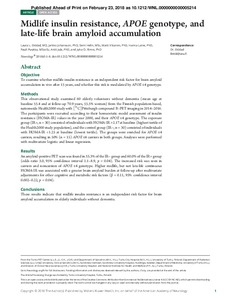Midlife insulin resistance, APOE genotype, and late-life brain amyloid accumulation
Ekblad LL; Johansson J; Helin S; Viitanen M; Laine H; Puukka P; Jula A; Rinne JO
Midlife insulin resistance, APOE genotype, and late-life brain amyloid accumulation
Ekblad LL
Johansson J
Helin S
Viitanen M
Laine H
Puukka P
Jula A
Rinne JO
LIPPINCOTT WILLIAMS & WILKINS
Julkaisun pysyvä osoite on:
https://urn.fi/URN:NBN:fi-fe2021042719494
https://urn.fi/URN:NBN:fi-fe2021042719494
Tiivistelmä
ObjectiveTo examine whether midlife insulin resistance is an independent risk factor for brain amyloid accumulation in vivo after 15 years, and whether this risk is modulated by APOE epsilon 4 genotype.MethodsThis observational study examined 60 elderly volunteers without dementia (mean age at baseline 55.4 and at follow-up 70.9 years, 55.5% women) from the Finnish population-based, nationwide Health2000 study with [C-11]Pittsburgh compound B-PET imaging in 2014-2016. The participants were recruited according to their homeostatic model assessment of insulin resistance (HOMA-IR) values in the year 2000, and their APOE epsilon 4 genotype. The exposure group (IR+, n = 30) consisted of individuals with HOMA-IR > 2.17 at baseline (highest tertile of the Health2000 study population), and the control group (IR-, n = 30) consisted of individuals with HOMA-IR < 1.25 at baseline (lowest tertile). The groups were enriched for APOE epsilon 4 carriers, resulting in 50% (n = 15) APOE epsilon 4 carriers in both groups. Analyses were performed with multivariate logistic and linear regression.ResultsAn amyloid-positive PET scan was found in 33.3% of the IR-group and 60.0% of the IR+ group (odds ratio 3.0, 95% confidence interval 1.1-8.9, p = 0.04). The increased risk was seen in carriers and noncarriers of APOE epsilon 4 genotype. Higher midlife, but not late-life continuous HOMA-IR was associated with a greater brain amyloid burden at follow-up after multivariate adjustments for other cognitive and metabolic risk factors (ss = 0.11, 95% confidence interval 0.002-0.22, p = 0.04).ConclusionsThese results indicate that midlife insulin resistance is an independent risk factor for brain amyloid accumulation in elderly individuals without dementia.
Kokoelmat
- Rinnakkaistallenteet [27094]
